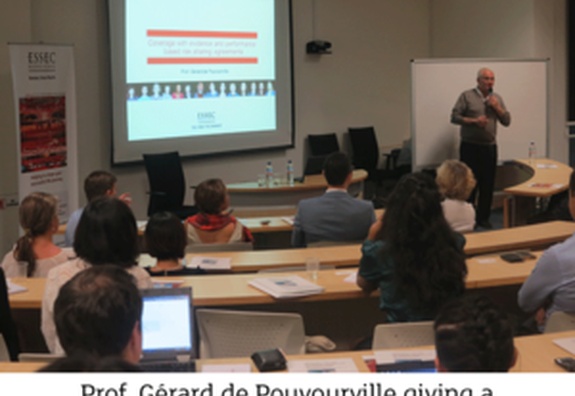HBS 1: Public Talk on Risk-Sharing Agreements between Payers and Health Industries
28.4.2014

The Public Talk on Risk-Sharing Agreements between Payers and Health Industries was held on 24th April at ESSEC Asia-Pacific. Led by Prof. Gérard de Pouvourville, Director of IHEM, ESSEC Business School, and moderated by Dr. Allen Lai, Director of IHEM Asia-Pacific, the panel discussion focused on the topic of Risk-Sharing Agreements as a solution to facilitate access to innovative treatment, with the participation of Mr. George Poole, Vice President and Managing Director of Medtronic ASEAN, Prof. Gérard de Pouvourville and Dr. Dhinagar Subramanian, Director of Qlaar Pte. Ltd.
Organised with the support of the American Chamber of Commerce in Singapore and ACCESS Health International, the event was the first in a series of Public Talks on Health, Business and Society, and attracted seasoned professionals from the healthcare industry who were interested in finding out more about risk-sharing agreements and the feasibility of such agreements.

Prof. de Pouvourville first introduced the concept of risk-sharing agreements, speaking about coverage with evidence and performance based risk-sharing agreements based on his work with the ISPOR Task Force, a task force initiated by the International Society for Pharmacoeconomics and Outcomes Research, on this topic. Such task forces are initiated to develop consensus reports (guidelines) on good practice standards for outcomes research and on the use of this research in health care decision making.
Previously, once companies had clinical proof of the product, they would be able to go to market and there would not be much questioning about the effectiveness of such drugs or products. Due to factors such as financial reasons and a growing concern about effectiveness and cost-effectiveness, a change in paradigm took place, in which the effectiveness of such drugs or products began to be questioned beyond clinical trials.
In the context of biologics, aversion to uncertainty aggravated the concern of payers on residual uncertainties on the effectiveness of drugs. Quoting the ISPOR Task Force, Prof. de Pouvourville explained that uncertainties could exist in internal validity, in which companies might not have gone far enough in testing the product, external validity, heterogeneity of population, which would apply more for medical devices, where a product might cause different responses across individuals, and diffusion uncertainty.
Responses to manage uncertainty include coverage with evidence. Increasingly, companies are required to provide additional evidence to reduce uncertainty, with coverage accepted conditionally to evidence, leading to the rise of Coverage with Evidence Development (CED). A wide range of CED Agreements exist, and if they include specific financial provisions, they are often called Risk-Sharing Agreements or Performance Based Risk-Sharing Agreements. Such agreements can be categorised into 3 ideal types: “No Cure, No Pay”, “See and Pay” and “See and Talk”.
The question of whether risk-sharing agreements are desirable was then discussed from both the payer’s perspective and the company’s perspective. In addition, in terms of the feasibility of risk-sharing agreements, key issues such as protocol design, choice of methodology, completeness of contract, timing and externalities exist. Concluding his presentation, Prof. de Pouvourville added that CED will continue to increase, but it would often be difficult to distinguish between whether such agreements are really CED or disguised price discounts.

A panel discussion then ensued, with intense discussions about the key issues as well as the challenges that companies face. Questions such as whether RSA should be the exception or the rule were raised. Dr. Subramanian spoke about factors which have led to an increased demand for Risk-Sharing Agreements, including the increased importance of real outcomes, the need to decrease time to market and the increase in data availability. Mr. Poole and Dr. Subramanian brought in insightful perspectives from the viewpoint of companies, which could have a different set of priorities in contrast to that of academics and payers. Mr. Poole spoke from a commercial viewpoint of a medical device company, where he shared that they were a commercial venture trying to do the best social good, being able to finance innovation and being able to let people afford it at the same time. He also added that Risk-Sharing Agreements might not be viable in emerging markets.
During the Q&A session, questions regarding the sustainability of such schemes, as well as the viability of such agreements in emerging markets were raised. In response to this, Mr. Poole elaborated that from the company point of view, it would be more about disease management, as the definition of “risk-sharing” can be subjective, and truly sharing the risks of a product or drug might not be possible.
Regarding Risk-Sharing Agreements, Prof. de Pouvourville also added that it might be difficult to isolate or disentangle the effects of the effectiveness of a drug with a country’s health system. The behaviour of patients would also make a difference to the true effectiveness of a drug. With so many different factors influencing the true effectiveness of a drug, even if a control experiment is done, it might not be easy to isolate the true effects of the drug.
Participants of the Master Class were also curious to know about examples of Risk-Sharing Agreements in Singapore. Dr. Subramanian explained that risk-sharing might not necessarily be applicable in Singapore, as Singapore is a self-paying market, and the key issue for Singapore would be to find methods for consumers to pay for the products they need.
Learn more about the Institute of Health Economics and Management at this page.